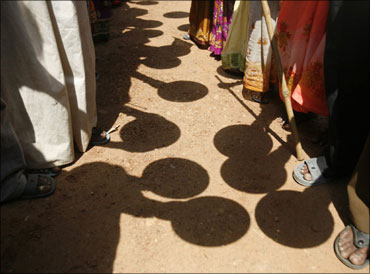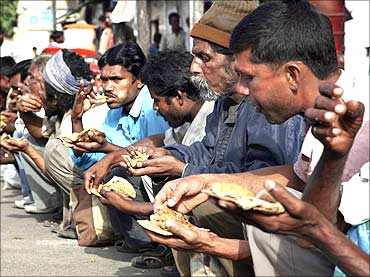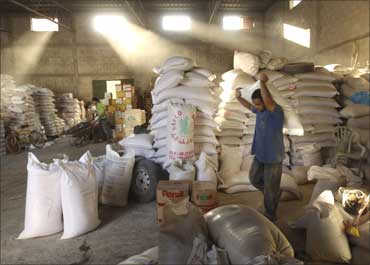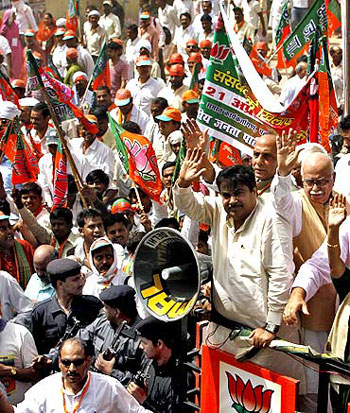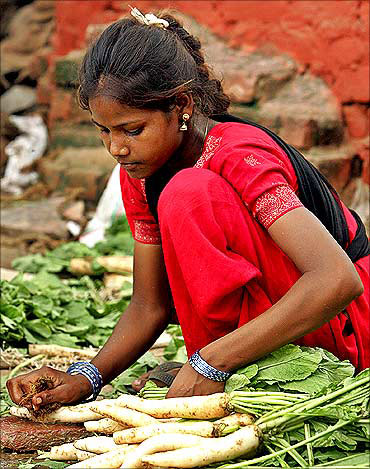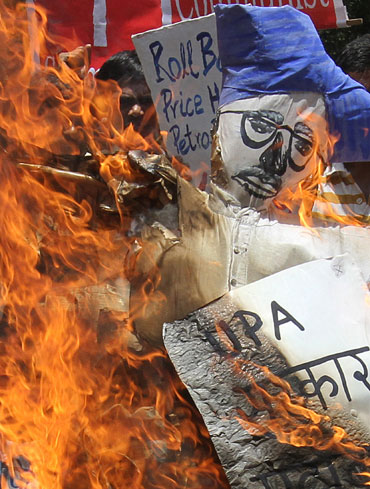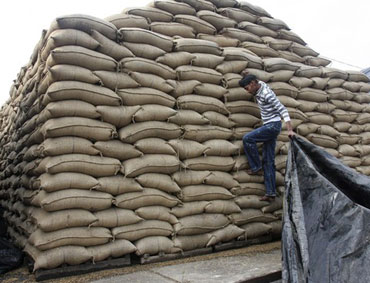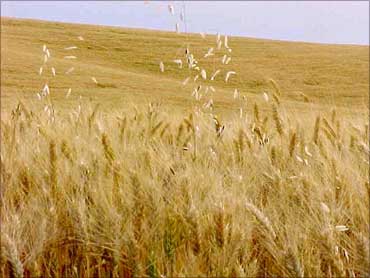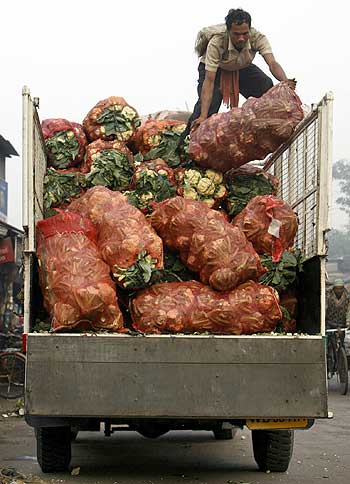 | « Back to article | Print this article |
Why PDS overhaul is a must for India's food security!
Writ Petition (Civil) No. 196 of 2001 concerning citizen's Right to Food has been listed again for hearing on September 6, 2010 in the Supreme Court and the central government has to give its response before that.
In the recent years, the whole issue can be traced back to the public interest litigation filed by the People's Union for Civil Liberties (PUCL, Rajasthan) in April 2001 in the Supreme Court seeking legal enforcement of the Right to Food.
The core argument remains that the Right to Food is included in the fundamental Right to Life enshrined in Article 21 of the Indian Constitution. Although like the Apex Court's 'interim orders' on this historic case, the Indian government's approach too remains quite interim.
The fact is that it has provided an opportunity to hold the government and the likes of Sharad Pawar, the Union agriculture minister, accountable.
The court has noted in its August 31 order that 'about 50,000 metric tonnes of wheat has already deteriorated and is not fit for human consumption. Several lakh metric tonnes of wheat which was procured was not been properly preserved.'
The court is right in observing that the Food Corporation of India -- a focal point for the public distribution system (PDS) with a network of 4.78 lakh (478,000) fair price shops making it the largest retail system of its type in the world -- must properly evaluate capacities of their godowns with focus on cardholders of Antyodaya Anna Yojana and Below Poverty Line.
Click NEXT to read on . . .
Why PDS overhaul is a must for India's food security!
However, it appears to have been misled into believing that a Targetted PDS can work.
On August 12, the Apex Court asked the central government to undertake free distribution of foodgrain to the poor instead of allowing it to rot in the FCI godowns.
"Give it to the hungry poor instead of it (grains) going down the drain," a bench of Justices Dalveer Bhandari and Deepak Verma directed the central government. The bench passed the direction while dealing with the above mentioned PIL.
The measures suggested by the Apex Court in an order include: 1) Increase in the quantum of food supply to the population Below Poverty Line, 2) Keep fair price shops open on all 30 days a month, and 3) Distribute foodgrains to the deserving population at a very low, or no, cost.
Agriculture Minister Sharad Pawar responded to Supreme Court's recommendations saying, "It is not possible to implement the Supreme Court's suggestion," even as in Punjab, 49,000 tonnes of foodgrain went to waste.
In Uttar Pradesh, 1 lakh (100,000) sacks of wheat are left in the open despite there being enough space in godowns. Another 450,000 sacks of wheat, worth Rs 25 crore (Rs 250 million) was damaged due to rains in UP. In Haryana, 3 lakh (300,000) sacks of wheat were wasted due to the floods.
Click NEXT to read on . . .
Why PDS overhaul is a must for India's food security!
The chief ministers of these states demanded that the government give them this grain to feed the poor. The Apex Court rightly rebuked the agriculture minister underlining that it was an order and not a suggestion. But one should be wary of judicial pronouncements because they tend to say much more than they do.
Indeed, grand judicial pronouncements are not uncommon but there is a gulf between what do-gooders say and what they imply amidst their misplaced propensity to pander to the fiscal wisdom of business enterprises.
Why PDS overhaul is a must for India's food security!
Sadly, instead of directing Universal PDS as a solution, the Apex Court opined, 'It is desirable to abolish the category of the Above Poverty Line altogether. In case it is not possible, then the government should at least consider limiting households whose annual income is less than Rs 200,000 per year. We see no rationale or justification in providing subsidised foodgrain to card holders whose annual income is more than Rs 200,000.'
The court said, 'A survey is required to get a clearer picture of the targetted population in the categories of APL, BPL and AAY.' Such touching faith in the now discredited Targetted PDS system hinges on inherent distaste for food subsidy which was about Rs 37,000 crore (Rs 370 billion) during 2008-09 and its leakage to the ineligible citizens.
Click NEXT to read on . . .
Why PDS overhaul is a must for India's food security!
A regressive unique identification number (UID) project has been set up within the Planning Commission, with Nandan Nilekani as its chairperson, and it claims to be aimed at plugging leakages in the PDS.
This structurally adjusted Targetted PDS pretends to support fellow citizens who live below the poverty line with a monthly supply of subsidised foodgrain with such remarkable inefficiency and incompetence that even the Planning Commission is compelled to say that 'for every Rs 4 spent on the PDS, only Rs 1 reaches the poor' and that '57% of the PDS foodgrain does not reach the intended people.'
This creates a compelling rationale for a Universal PDS at the rate of 35 kg per family. Notably, the amount of tax revenue foregone is several times the amount the government gave towards all kinds of subsidies.
India's current population is estimated at 115 crore (1.15 billion). If even 80 per cent of it is covered it would imply a coverage of 92 crore (920 million) individuals. Assuming an average family size of around 4.8, the total number of households to be covered would be 19.17 crore (191.7 million).
The total amount of foodgrains required would be 805.1 lakh (80.51 million) tonnes. The offtake of foodgrains under the current TPDS in 2008-09 was only 348 lakh (34.8 million) tonnes. This would require an additional amount of only about Rs 42,237.9 crore (Rs 422.379 billion) -- at constant Minimum Support Price and economic costs.
Click NEXT to read on . . .
Why PDS overhaul is a must for India's food security!
This would amount to only 0.64 per cent of India's gross domestic product (GDP). The total food subsidy required would amount to just 1.48 per cent of the GDP. This year alone, Finance Minister Pranab Mukherjee in his Union Budget gifted over Rs 5 lakh crore (Rs 5 trillion) to business enterprises, which is around 8 per cent of the GDP.
It is a small price to pay to make India hunger-free. If fellow citizens remain hungry, it makes our country diseased and undermines the nation's productivity and its security.
What is happening now in the Apex Court, Parliament and media with regard to this is a consequence of a purposeful Right to Food campaign underway that demands a broad Right to Food Act and not a narrow 'National Food Security Act' proposed by the Congress-led United Progressive Alliance government and the National Advisory Council (NAC).
The parochial nature of the National Food Security Act can be gauged from its provision that entitles each BPL household to a monthly ration of 25 kg of foodgrain at Rs 3 a kg. If the Right to Food campaign has not been hijacked as yet, there will be no compromise on their demand for the universalisation of the PDS.
The NAC met on August 30 to work out the amount of grain to be distributed to each family and its economic cost under the Food Security Act. The NAC will be meeting next on September 24 to increase the quantum of food grain to be distributed.
Click NEXT to read on . . .
Why PDS overhaul is a must for India's food security!
The NAC's sub-committee on Food Security Act has divided the citizens into rural and urban. The council's first model talks of a 'near universalisation' model that would entail providing 35 kg of grain at Rs 3 per kg to all rural households, except the top 20 per cent. The second model is 'universal, with differential entitlements', dividing the eligible group into APL and BPL to ensure that 42 per cent of rural households receive 35 kg grain every month at Rs 3 per kg and rest of the rural households get 25 kg grain at a price between Rs 5 and Rs 7.50 per kg.
With regard to urban citizens, the NAC proposes only one approach to address about 33 per cent of the households for 35 kg of grain every month at Rs 3 per kg with special attention towards slum dwellers, households in vulnerable occupations, socially vulnerable households, and the homeless.
The first option can keep big landowners, traders and taxpayers outside the beneficiary list but there is a risk of the misuse of the exclusion criteria. The second option can ensure that no one is left out but has to rely on one of the existing 'BPL surveys' -- or rural development ministry's pilot survey -- and has to administer different quantities to different households at different rates.
But the NAC's current focus on 150 districts for Universal PDS is akin to it being half-pregnant. It is being said that in the first year Universal PDS will cover these districts and then it would get extended to all districts over the next four years. Such surgical interventions do not address the core demands of the Right to Food campaigners.
Click NEXT to read on . . .
Why PDS overhaul is a must for India's food security!
The Right to Food campaign demands that the causes of hunger be addressed and the legal entitlement for food in keeping with the enabling orders of the Supreme Court does have unambiguous merit.
Even in this era of ideological conundrum it cannot be disputed that the primary responsibility to guarantee basic entitlements rests with the government.
In furtherance of the same, it is legislating a National Food Security Bill. There is no denying the golden heartedness of the campaigners of the Right to Food Act who seek special protection for the excluded and vulnerable groups.
In such a backdrop, no sane human being (sans those dehumanised by obscene prosperity) can oppose the demand for universalisation of the PDS which envisages that every resident of our country must be covered by the public distribution system.
Such a system would ensure that each adult is entitled to 14 kg of cereals per month, along with 1.5 kg of pulses and 800 gm of cooking oil. The cereals must include nutritious millets. The Universal PDS will ensure that cereals are priced at Rs 2 a kg, pulses at Rs 20 per kg and cooking oil at Rs 35 per kg.
Click NEXT to read on . . .
Why PDS overhaul is a must for India's food security!
All households must be under Universal PDS with 14 kg of foodgrain per month at Rs 2 a kg per adult, 1.5 kg dal and 500 gm cooking oil through the PDS. Antyodaya households must get double the PDS quotas at half the PDS prices.
Earlier, Universal PDS was introduced in 1965 as the most important instrument for distribution of procured grains in the deficit regions as it became evident that the market cannot substitute State intervention. However, its implementation required massive improvement. Instead of undertaking remedial measures, in 1997, the universal character of the PDS was converted it into a 'targetted' scheme that led to the classification of the Indian citizenry into APL and BPL (Above Poverty Line and Below Poverty Line) categories and only those households classified as BPL were made eligible for subsidised purchase of commodities from ration shops.
The APL households could purchase commodities as well, but at the full 'economic cost' of the handling of commodities. Such 'narrow targeting of the PDS based on absolute income-poverty' led to the exclusion of 'a large part of the nutritionally vulnerable population from the PDS'.
Revealing the warped priorities of pre- and post- independent Indian governments, the demand for a 'Food First' policy seeks non-negotiable priority to all natural resources, including land and water for food.
Click NEXT to read on . . .
Why PDS overhaul is a must for India's food security!
It is surprising that such an obvious policy isn't already part of the wisdom of the officialdom and the Planning Commission.
Had it been part of the government's official understanding, every policy of the government would have factored in the crucial issue of 'virtual water' for Right to Food and for intergenerational equity.
The demand for all ration cards to be issued in the name of women is quite welcome. There cannot be any disagreement with the necessity for immediate action on hunger and drought, especially in the 278 drought and cyclone affected districts.
One wonders as to why it is not eminently obvious to planners and bureaucrats that mid-day meals to all out-of-school children too is a must and mid-day meals should continue even during vacations.
Click NEXT to read on . . .
Why PDS overhaul is a must for India's food security!
The agriculture minister and the Planning Commission must be deemed to be committing treason if they fail to provide support to children aged 0-6 months by assisting their mothers for exclusive breastfeeding through assistance at birth, breastfeeding counselling, maternity entitlements and creche facilities at the work place. The same should apply if children aged 6 months to 3 years do not get nutritious take-home rations based on local foods, delivered every week through the local Anganwadi.
It should be considered a crime if children aged 3-6 years are not provided with nutritious cooked meal and food supplements at the local Anganwadi, and if children aged 6-14 years do not have access to nutritious cooked mid-day meal provided in all government schools up to Class 8.
While land rights, starvation deaths, coercive displacement, forest rights, natural resource management, social exclusion and other issues are directly linked, as a legacy of the Industrial Revolution and the British Parliament, our legislature disregards comprehensive ecological approach and adopts a tunnel view that limits it to initiate clinical operations such as National Food Security Bill.
The media, parliamentarians and citizens must consume judicial grandstanding with a pinch of salt. Penchant for judicial sensationalism led to the Apex Court declaring world's most ecologically catastrophic initiative 'Networking of Rivers' project being declared necessary for food security that has compelled political parties and different ministries to speak with a forked tongue.
